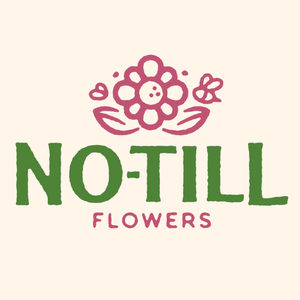
The No-Till Flowers Podcast
Jennie Love
- 1 hour 12 minutesRegenerative Flower Farming with Jennie Love: A Replay from The Flower Podcast
In today's episode, we are replaying an interview that originally aired on The Flower Podcast, where host Scott Shepherd interviewed yours truly, Jennie Love, about regenerative flower farming. This seemed like a great conversation to include in the archives here on No-Till Flowers. Deep gratitude to Scott for sharing it with us!
Be sure to follow The Flower Podcast for more great flora-focused conversations.
And there are new fresh episodes coming soon! A few guests got hit with the flu and it's pushed back our production schedule. But we're getting everything rescheduled and will be hitting the air soon with those!
WANT TO LEARN MORE?
You'll also gain access to lots of helpful articles, discussion boards, and online courses.
On-demand Short Courses for Farmers on RFFN:
- Foliage for the Win
- Successful Flower CSAs and Subscriptions
- CREW: Hiring and Managing
- Simple Steps to Better Marketing
- Woodies: Playing the Long Game (coming in February 2025)
Tap into the above courses and resources any time you need. These are available on-demand through the Regenerative Flower Farmers Network. Current RFFN members shoud follow this link to access the Short Courses at the discounted member rate.
Past episodes for further learning about regenerative farming practices include:
Episdoe 29: Nutrient Balancing in Living Soils with Bryan Mason
Episode 34: Why I Love to Spray at My Farm: Boosting the Phyllosphere
Episode 17: Natural Inputs with Nigel Palmer
Episode 15: Korean Natural Farming and JADAM in Flower Farming with Tony Gaetz of Bare Mountain Farm
HAVE IDEAS AND FEEDBACK ABOUT THE PODCAST? Share your opinions in this brief survey.
As always, if you appreciate this podcast and all the education it provides, please take a moment out of your day to rate and write a review for it on Apple Podcasts or wherever you are listening to it.
22 January 2025, 12:35 am - 1 hour 31 minutesOrganic Seed Breeding with Will Hazzard
In this episode, we’re digging into organic seed production. Seed saving and breeding are all the rage in the flower farming world at the moment, which is an exciting way to dive even deeper into the world of flowers and get even nerdier. And we all love getting nerdier, don’t we? :-)
Today's guest, Will Hazard, is the zinnia breeding project lead at the University of California, Davis. Through the SCOPE program -- which stands for Sustainable Crop Production and Enhancement, Will and his team of fellow research students have been breaking new ground in flower breeding that benefits both the environment and future generations of farmers. In particular, they’ve honed in on zinnias to breed for better stem length and disease resistance. In this conversation, Will unpacks the challenges, the innovations, and the incredible potential of this vital field of study.
Mentioned in this Episode:
Video demo of saving zinnia seeds properly
UC Davis Instagram (with lots of zinnia breeding photos)
Tips for Getting Involved in Organic Seed Breeding
Podcast with John Kempf and Dr. James White discussing seed biomes
Email Will directly at [email protected]
WANT TO LEARN MORE?
You'll also gain access to lots of helpful articles, discussion boards, and online courses.
On-demand Short Courses for Farmers on RFFN:
- Foliage for the Win
- Successful Flower CSAs and Subscriptions
- CREW: Hiring and Managing
- Simple Steps to Better Marketing
- Woodies: Playing the Long Game (coming in February 2025)
Tap into the above courses and resources any time you need. These are available on-demand through the Regenerative Flower Farmers Network. Current RFFN members shoud follow this link to access the Short Courses at the discounted member rate.
---
If you enjoyed this episode, you might also want to listen to:
Episode 28: Seed Starting, Regenerative Style with Lisa Mason Zeigler
Episode 24: Farming to Heal the Ecosystem with Dr. Doug Tallamy
---
Sign up for our newsletter so you'll be the first to know about special events and other opportunities.
Follow @notillflowers on Instagram for more content.
HAVE IDEAS AND FEEDBACK ABOUT THE PODCAST? Share your opinions in this brief survey.
As always, if you appreciate this podcast and all the education it provides, please take a moment out of your day to rate and write a review for it on Apple Podcasts or wherever you are listening to it.
Thanks for tuning in!
23 December 2024, 3:08 pm - 1 hour 28 minutesFeeding Our Own Biomes with Functional Medicine
Welcome to Season 5 of No-Till Flowers! It's good to be back!! We’re starting off with a fairly personal episode as I share what’s changed for me and my health in 2024.
This past season was my 17th season farming and selling flowers. There has been a lot of wear and tear on my body, mind and spirit along the way. I would wager heavily that no small business owner understands what they are signing up for at the beginning. Or even many years into it. The first 10 or so years are just holding on for dear life. The highs and lows of this rollercoaster ride lurch your emotions and mind all over the place. For too long, we define success as making a sale and making a customer happy. In most cases, we outright forfeit our own well-being. At least that certainly was the case for me.
When our bodies are under chronic elevated stress and we’re not eating well (which pretty much describes every farmer), our internal ecosystem starts to break down. Our bodies host trillions of microbes that that make us surprisingly similar to soil biomes. In this episode, we learn about how to better support our personal gut biomes so we can better support our farms and larger communities.
My guest today is Susan Brown, a functional medicine practitioner I've worked with over the past year to improve my own biome. If you’d like to work directly with Susan, her website is https://www.nourishwithsusanbrown.com/
Find a functional medicine practitioner near you with this site: https://www.ifm.org/find-a-practitioner
If you’d like to learn more about supporting your gut biome and supporting your body as a whole, here are a few links to podcasts that can help you learn more:
Dr. Zach Bush interview on Feel Better, Live More Podcast
Dr. William Li interview on Feel Better, Live More Podcast
How to Control Blood Sugar on Feel Better, Live More Podcast
Susan mentioned a supplement, Ion Biome, made from ancient soil. Here’s the link to that. Please note that I have not tried this supplement personally so can not speak to its effectiveness.
Other Supplements she mentioned were:
- Cytozyme-AD for adrenal support
- Magnesium glycinate
- LMNT for electrolytes and magnesium
- Vitamin D3 K2 (remember to eat some fat at the same time you’re taking this one – like an avocado)
Here’s a recipe for a quick and healthy meal you can take into the field with you:
CHOCOLATE CHIA PUDDING
- 1 can of unsweetened full fat coconut milk (Try Native Forest brand)
- 1 scoop chocolate protein powder (Try SunWarrior brand if you don’t have a favorite already)
- 6 Tbsp chia seeds
- 1 tsp vanilla extract
- 1 pinch of sea salt
- dash of cinnamon (optional)
Mix everything together. Use an immersion/stick blender to get it all really combined for a smooth creamy pudding. Divide out into glass jars or other containers you can grab on the go. Keep cold. Can be stored in the fridge for 3-4 days. When you're ready to eat, top with fresh berries and/or shredded coconut.
Why is this recipe so good for you?
Coconut milk is a superfood that heals and supports for your gut microbiology. And all the good fat in it balances your blood sugar levels so your energy is stable throughout the day (no more sugar crashes!). Chia seeds, also a superfood, have tons of fiber and omega-3. The protein powder helps your muscles recover from fatigue faster. The sea salt adds some micronutrients and electrolytes. And the fresh berries on top add more fiber and antioxidants. Plus it's just dang yummy!
Would you like more recipes and a chance to connect with others who have experiences similar to yours? Join the Regenerative Flower Farmers Network (RFFN) for just $20/year if you'd like to continue the conversation on topics covered in this episode.
On-demand Short Courses for Farmers Available on RFFN:
- Foliage for the Win
- Successful Flower CSAs and Subscriptions
- CREW: Hiring and Managing
- Simple Steps to Better Marketing
Tap into the above courses and resources any time you need. These are available on-demand through the Regenerative Flower Farmers Network.
13 December 2024, 6:55 pm - 1 hour 4 minutesTips for Wholesale Flower Sales with Scott Shepherd
We don’t typically dive into business topics on this podcast as I like to keep the focus on regenerative growing practices. But today we’re going to go off theme a bit for a special guest. Many of you already know Scott Shepherd, the host of The Flower Podcast.
Scott has such a unique position in our industry. He studied horticulture under the likes of Dr. Allan Armitage. His day job in the three decades since has been working in sales at wholesale houses, first in Georgia and now in Tennessee. In that role, he’s touched every facet of the global import market. He’s also had a long-standing side hustle as a grower of specialty stems like hellebores. And as a podcaster, he’s had many in-depth discussions with both florists and flower farmers.
Scott recently interviewed me about regenerative farming for his own podcast. At the end of that chat, I asked him if I could switch seats with him, so to speak, and ask him so long burning questions I had about selling flowers through a traditional wholesaler. I don’t know about you, but it’s always felt a bit mysterious. Exactly how does one go about approaching a big wholesaler? What quantities do you need to bring to the table? What kind of prices could you get? What was supposed to be just a brief chat turned into a lengthy and very enlightening conversation I thought you’d all like to hear.
In addition to this episode here on No-Till Flowers, you can catch another piece of my conversation with Scott on a new podcast I’m currently hosting called Floral Guild Radio. Yep, you read that right! There’s now a second podcast where you can hear me talk about flowers. Floral Guild Radio is much more geared towards the business side of flowers, particularly selling to florists. I’d love to have you tune in there too!
As always, a big shout out to members of the Regenerative Flower Farmers Network who, through their membership, so generously support the making of this podcast! If you’re not a member but you’d like to join, it’s just $20 a year. Lots of detailed articles, podcast transcripts, and a community chat are available on RFFN. If you’ve ever had follow up questions to episodes here, that’s the place to go to ask!
Many of you may be in hiring mode for your farms right now. I’d love to help you be less intimidate by hiring and find a better flow to managing a crew that doesn’t consume all your brain space and time. I have an online short course called CREW that is focused on the best practices of hiring, training, and managing farm crews. If this sounds like something you could use, head to the show notes to grab the link.
Others of you may not be ready to hire, but could use a helping hand with decision making and trouble shooting this season. I host a monthly small group cohort for regenerative growers on RFFN and would be happy to field all your questions there. Look for the link to that in the show notes as well!
Additional places to find Scott Shepherd:
The Flower Podcast Instagram feed
The Flower Podcast YouTube channel
The Pansy Appreciation Society Instagram feed.
3 April 2024, 1:15 am - 1 hour 44 minutesStoring Peonies and Tulips + How to Handle Cut Flowers After Harvest with Dr. John Dole
There are some incredible nuggets of pure gold in this episode. You will definitely want to have a pen and paper handy!
Joining me today is Dr. John Dole, cut flower researcher and professor at North Carolina State University. As you’ll hear in the episode, John has been immersed in flowers since he was just 8 years old, planting gladiolas at a neighbor’s farm in Michigan. Over the decades, he’s been a keystone leader for the floral industry, serving farmers and florists alike with his valuable research projects.
John is well known for his work with the Association of Specialty Cut Flower Growers, which is where I met him years ago. My friendship with John is an example of how priceless a membership in the Association can be. If you are not already a member of the ASCFG, you’ll want to click the link above right now to join. While John and I were talking here for the podcast, I was reminded how much I have learned over the years from him and others who have generously shared their knowledge through the ASCFG.
For flower farmers, John, along with his posse of awesome graduate students, has done a lot of studies on what we call "post harvest handling" of cut flowers. Basically, what are the best practices growers can implement after harvesting to get the longest vase life out of their crops. You can be a dynamite grower, but if you don’t know how to handle your flowers after they’re picked, you won’t have happy customers or a sustainable business.
In this episode, John and I talk about a handful of key crops and how to handle them after harvest. You are going to be shocked by what he has to say about storing peonies and tulips! For peonies, the ideal temperature for dry storage is 31F, for up to 16 weeks. For tulips, leave the bulb on and dry store at 31F for up to 8 weeks.
We also go down a rabbit hole about water quality and flower food. To be honest, I hadn’t planned to pick John’s brain about those, but I’m so glad the topic came up because it was really informative! I’ve long been anxious about using flower food and holding solutions because there are no organic certified options on the market. I assumed they were full of harsh chemicals that I wouldn’t want to dump out into my farm’s ecosystem. John sheds some light on this subject and I think you’ll find it reassuring to hear.
Some useful resources related to this episode:
Chrysal (post-harvest flower products)
Waypoint Labs (for water testing)
All of John's Research Publications
Postharvest Handling of Cut Flowers and Greens (reference book written by John)
WANT TO LEARN MORE? Join the Regenerative Flower Farmers Network! It's just $20/year and you'll have access to lots of articles, videos, online courses and live Q&As -- all related to regenerative farming and sustainable business practices.
On-demand Short Courses for Farmers available on the Regenerative Flower Farmers Network:
- Foliage for the Win
- Successful Flower CSAs and Subscriptions
- CREW: Hiring and Managing
- A Guide to No-Panic Marketing
- Woodies: Playing the Long Game (coming in spring 2024)
*Note: You'll need to become a RFFN member in order to register for the online courses.
Past episodes for further listening include:
Episdoe 12: The Everything Tulips Episode with Dave Dowling
Episode 20: The Everything Ranunculus Episode with Dave Dowling
Episode 36: Cool Flowers, Native Headerows and Frost Cloth with Lisa Mason Zeigler
Episode 38: Plant Tissue Testing Explained with Bryant Mason
HAVE IDEAS AND FEEDBACK ABOUT THE PODCAST? Share your opinions in this brief survey.
As always, if you appreciate this podcast and all the education it provides, please take a moment out of your day to rate and write a review for it on Apple Podcasts or wherever you are listening to it.
16 February 2024, 4:39 pm - 38 minutes 36 secondsPlant Tissue Testing Explained with Bryant Mason
Welcome to Part 2 of a recent interview host Jennie Love had with guest Bryant Mason of Soil Doctor Consulting.
If you haven’t already listened to Episdoe 37 or Episode 29, stop this one now and go back to listen to those first. In this segment, Bryant helps listeners understand what plant tissue testing is and why it is so valuable for farmers to do. Bryant walks us through a tissue test for stock grown at Jennie's farm, explaining how to read the various nutrient values and make decisions for future fertilization.
If you'd like to see the tissue test result sheet Bryant and Jennie discuss in this episode, along with other test results from Jennie's crops, join the Regenerative Flower Farmers Network (RFFN) to have a look at those.
Two labs that Jennie has used for tissue testing flower crops are:
At the end of this conversation, we also get a nice list of resources listeners can use to increase their knowledge of organic and regenerative growing. Here are links to most of those:
- The Nature and Properties of Soils textbook
- The Mineral Nutrition of Higher Plants textbook
- Nigel Palmer's book The Regenerative Grower's Guide to Garden Amendments
- Nigel Palmer's interview on this podcast
- Bryan O' Hara's book No-Till Intensive Vegetable Culture
- Shaping Fire podcast
- Regenerative Agriculture podcast
- ATTRA Voices from the Field podcast
- Priming for Production podcast
- Tractor Time podcast
- Field Lab Earth podcast
- Cannibas Cultivation and Science podcast
- Decode 6 podcast
- No-Till Growers podcast
This conversation with Bryant was broken into two episodes since it was full of so much information. So be sure to go back and listen to the first half in Episode 37.
Follow Bryant on Instagram @soil_doctor.
Bryant has developed an easy online tool to help you directly to interpret your soil tests and choose natural amendments accordingly. Click here to learn more.
- - -
On-demand Short Courses for Farmers available on the Regenerative Flower Farmers Network:
- Foliage for the Win
- Successful Flower CSAs and Subscriptions
- CREW: Hiring and Managing
- Simple Steps to Better Marketing (coming in late January 2024)
- Woodies: Playing the Long Game (coming in February 2024)
Tap into the above courses and resources any time you need. These are available on-demand through the Regenerative Flower Farmers Network.
23 January 2024, 12:48 am - 1 hour 17 minutesOrganic Fertilizers, the Crucial Role of Calcium, Orchard Establishment and Much More with Bryant Mason
Guest Bryant Mason of Soil Doctor Consulting returns to the podcast for another lively conversation about organic nutrients with host Jennie Love.
If you haven’t already listened to Episode 29 in Season 3, stop this one now and go back to listen to that one first. In Episode 29, we introduced Bryant to the flower farming community and we had a dynamic conversation about nutrient balancing in living soils. Bryant, a certified agronomist for organic growers and an orchardist living in Colorado, has an exquisite knack for making complicated sciency topics sound simple and do-able.
In this whirlwind tour de force we cover:
- Gypsum applications
- Analysis of WCA (homemade calcium input in Korean Natural Farming)
- Foliar Feeding Best Practices
- Detering Pests by Choosing the Right Organic Fertilizer
- EC/Salts
- Amino Acids and other Nitrogen Sources
- Orchard establishment and management
- Soil Paste Testing
- A Recipe for Biannual Soil Drench to supercharge your crops
This conversation with Bryant was broken into two episodes since it was full of so much information. So be sure to come back for the second half in Episode 38.
Follow Bryant on Instagram @soil_doctor.
Bryant has developed an easy online tool to help you directly to interpret your soil tests and choose natural amendments accordingly. Click here to learn more.
Mentioned in this episode:
On-demand Short Courses for Farmers on RFFN:
- Foliage for the Win
- Successful Flower CSAs and Subscriptions
- CREW: Hiring and Managing
- Simple Steps to Better Marketing (coming in late January 2024)
- Woodies: Playing the Long Game (coming in February 2024)
Tap into the above courses and resources any time you need. These are available on-demand through the Regenerative Flower Farmers Network.
17 January 2024, 6:03 pm - 1 hour 16 minutesCool Flowers, Native Hedgerows, and Frost Cloth with Lisa Mason Zeigler
Today’s guest needs little introduction in the flower farming world. Lisa Mason Zeigler of the Gardener's Workshop is an author, teacher, industry leader, flower farmer, podcaster, and also a good friend of mine. With 25 years of growing under her belt, Lisa brings a wealth of knowledge and passion to everything she does.
Lisa has a new book, The Cut Flower Handbook, coming out in a few weeks, which prompted this conversation. But we cover several topics in our chat, including:
- Changing hardiness zones
- How cool flowers are even more important in farm resilience and profitability in the face of accelerating climate change
- Her new book's content
- Tips for growing Bells of Ireland
- Establishing natural hedgerows
- Mulching for soil health
- Using Frost Cloth for Season Extension
Mentioned in this Episode:
On-demand Short Courses for Farmers on RFFN:
- Foliage for the Win
- Successful Flower CSAs and Subscriptions
- CREW: Hiring and Managing
- Woodies: Playing the Long Game (coming in February 2024)
- Simple Steps to Better Marketing (coming in January 2024)
Tap into the above courses and resources any time you need. These are available on-demand through the Regenerative Flower Farmers Network. Current RFFN members shoud follow this link to access the Short Courses at the discounted member rate.
If you enjoyed this episode, you might also want to listen to:
Episode 28: Seed Starting, Regenerative Style with Lisa Mason Zeigler
Episode 24: Farming to Heal the Ecosystem with Dr. Doug Tallamy
Lisa's great podcasts: Field & Garden and Seed Talk
---
Sign up for our newsletter so you'll be the first to know about special events and other opportunities.
Follow @notillflowers on Instagram for more content.
HAVE IDEAS AND FEEDBACK ABOUT THE PODCAST? Share your opinions in this brief survey.
As always, if you appreciate this podcast and all the education it provides, please take a moment out of your day to rate and write a review for it on Apple Podcasts or wherever you are listening to it.
Thanks for tuning in!
7 January 2024, 6:40 pm - 1 hour 20 minutesFarming on Heavy Wet Clay + No-Till Lessons Learned with Jesse Frost
Today’s guest needs little introduction in the small farm no-till world. Jesse Frost of Rough Draft Farm in central Kentucky has helped so many of us learn about soil health and diversified small scale production through the No-Till Growers YouTube channel, the No-Till Growers podcast, and his book The Living Soil Handbook.
If you’ve struggled with heavy clay, boggy or compacted soils at your farm or in your garden, this is the episode for you! Frequently I get asked about my recommendations for clay and poorly draining areas, but I actually have no experience with those conditions myself. Jesse does. And I eagerly picked his brain for you all. You're welcome! 😉
We talk a bit about cover crops for clay soils, including tillage radish, phacelia, sorghum sudangrass, vetch, and winter rye.
Also in this episode, Jesse and I take a stroll down memory lane to consider both of our paths as regenerative growers. As you’ll hear, five or six years ago, there was only a trickle of guidance available for smaller farms looking to implement no-till practices on a production level. We both had to do a lot of experimenting on our farms and still do today. We mention the Singing Frogs interview on the Farmer To Farmer Podcast back in 2018, a key catalyst for both of our no-till journies. Also Andrew Mefferd's book The Organic No-Till Farming Revolution, which was published in the spring of 2019. Both are highly recommended if you haven't already discovered them.
Also Mentioned In This Episode:
The Regenerative Growers COHORT with me, Jennie Love, is a year-long, small group coaching program for those that need a little help learning how to apply all the concepts and practices talked about here on the podcast. To learn more, click here.
Other On-demand Short Courses for Farmers:
- Foliage for the Win
- Successful Flower CSAs and Subscriptions
- CREW: Hiring and Managing
- Woodies: Playing the Long Game (coming in February 2024)
- Simple Steps to Better Marketing (coming in January 2024)
Tap into the above courses and resources any time you need. These are available on-demand through the Regenerative Flower Farmers Network. Current RFFN members shoud follow this link to access the Short Courses at the discounted member rate.
If you enjoyed this episode, you might also want to listen to:
Episode 14: Breaking Down Compost with Jesse Frost
Episode 33: Cover Cropping Basics for Small Scale Regenerative (Flower) Farms
Episode 13: Improving Poor Compost with Ellen Polishuk
Episode 28: Seed Starting, Regenerative Style with Lisa Mason Zeigler
Episode 12: The Everything Tulips Episdoe with Dave Dowling
---
Sign up for our newsletter so you'll be the first to know about special events and other opportunities.
Follow @notillflowers on Instagram for more content.
HAVE IDEAS AND FEEDBACK ABOUT THE PODCAST? Share your opinions in this brief survey.
As always, if you appreciate this podcast and all the education it provides, please take a moment out of your day to rate and write a review for it on Apple Podcasts or wherever you are listening to it.
Thanks for tuning in!
29 December 2023, 1:34 pm - 27 minutes 42 secondsWhy I Love to Spray at My Farm -- Boosting the Phyllosphere
We're back with Season 4 of the No-Till Flowers Podcast! In this solo episode, host Jennie Love talks about regenerative spraying and how to boost the health of your crops with foliar feeding. Learn about the phyllosphere and what easy homemade inputs you can use to reduce pests and diseases with weekly foliar sprays.
Mentioned in this episode:
Join the Regenerative Flower Farmers Network if you'd like to continue the conversation on this topic.
Jennies on-demand short courses for fellow farmers:
- Foliage for the Win
- Successful Flower CSAs and Subscriptions
- CREW: Hiring and Managing
- Woodies: Playing the Long Game
- Simple Steps to Better Marketing
- Regenerative Farming Cohort
Tap into the above courses and resources any time you need. These are available on-demand through the Regenerative Flower Farmers Network. Current RFFN members shoud follow this link to access the Short Courses at the discounted member rate.
How to make WCA, a homemade calcium foliar feed.
How to make LAB, a homemade input for boosting good biology in the phyllosphere
Quorum Sensing TED Talk on YouTube
If you enjoyed this episode, you might also want to listen to:
Episode 15: A Little Goes a Long Way in Regenerative Farming with Tony Gatez
Episode 21: The Magical BRIX Number that Stops Pests with Dr. Tom Dykstra
Episode 23: Bokashi & Worm Farming with Matt Arthur
Episode 30: JADAM Basics, Making JMS and Other Natural Inputs
Sign up for our newsletter so you'll be the first to know about special events and other opportunities.
Follow @notillflowers on Instagram for more content.
HAVE IDEAS AND FEEDBACK ABOUT THE PODCAST? Share your opinions in this brief survey.
As always, if you appreciate this podcast and all the education it provides, please take a moment out of your day to rate and write a review for it on Apple Podcasts or wherever you are listening to it.
Thanks for tuning in!
4 December 2023, 6:21 am - 35 minutes 39 secondsCover Cropping Basics for Small Scale Regenerative (Flower) Farms
Curious about cover crops for a flower farm? Host Jennie Love walks listeners through a clear and concise overview of cover crops suitable for a small regenerative farm and why cover crops are such a valuable tool in the summer time for weed management. Included is a list of favorite cover crops for a small flower farm.
Mentioned in the episode:
Cover Crop Solutions Chart from Peaceful Valley
The Regenerative Flower Farmers Network (find a transcript of this episode there as well as lots of other helpful resources)
If you enjoyed this show, you will also enjoy listening to these past episodes:
- Episode 26: No-Till Basics: Bed PReparation Using the Deep Mulch System
- Episode 18: The Ins and Outs of Intercropping with Denise Richter
- Episdoe 17: Exploring the Science Behind Natural Farm Inputs with Nigel Palmer
- Episode 15: A Little Goes A Long Way In Regenerative Flower Farming: KNF and JADAM with Tony Gaetz of Bare Mountain Farm
Sign up for our newsletter so you'll be the first to know about special events and other opportunities.
Follow @notillflowers on Instagram for more content.
HAVE IDEAS AND FEEDBACK ABOUT THE PODCAST? Share your opinions in this brief survey.
As always, if you appreciate this podcast and all the education it provides, please take a moment out of your day to rate and write a review for it on Apple Podcasts or wherever you are listening to it.
Thanks for tuning in!
12 July 2023, 2:32 am - More Episodes? Get the App
Your feedback is valuable to us. Should you encounter any bugs, glitches, lack of functionality or other problems, please email us on [email protected] or join Moon.FM Telegram Group where you can talk directly to the dev team who are happy to answer any queries.
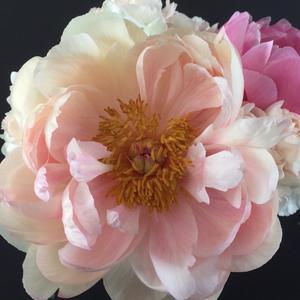 The Flower Podcast
The Flower Podcast
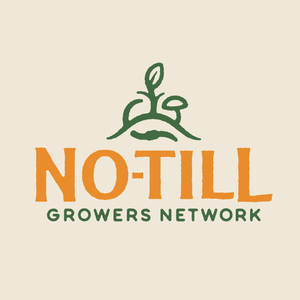 The No-Till Growers Podcast Network
The No-Till Growers Podcast Network
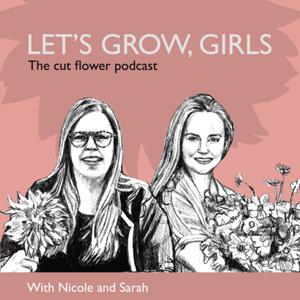 Growing Cut Flowers
Growing Cut Flowers
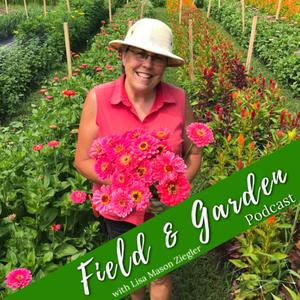 Field and Garden with Lisa Mason Ziegler
Field and Garden with Lisa Mason Ziegler
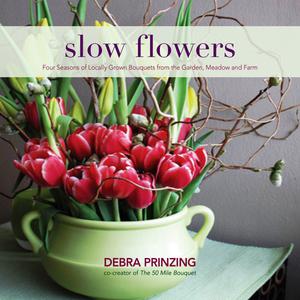 Slow Flowers Podcast
Slow Flowers Podcast